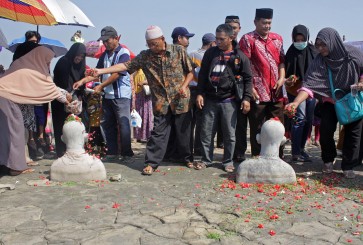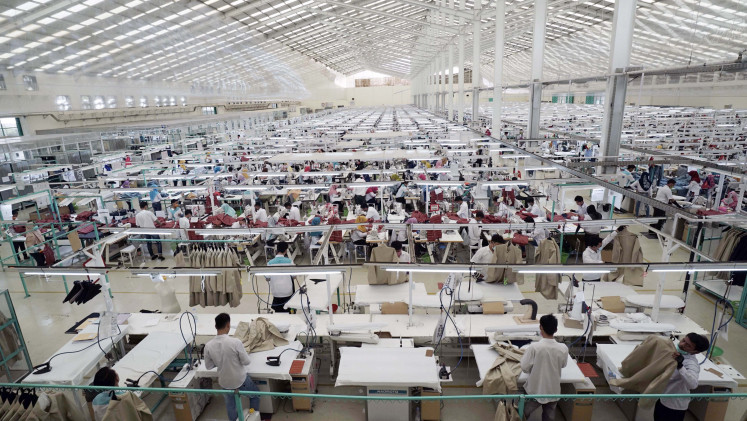The (real) green revolution
Better result: A bountiful harvest fertilized with cow manure
Change text size
Gift Premium Articles
to Anyone

B
span class="caption" style="width: 398px;">Better result: A bountiful harvest fertilized with cow manure.Hidden behind cement block walls, behind grid- locked roads of tourist buses, trucks and motor scooters, is another Bali.
Behind the acne of villas spotting the landscape like pimples on a pretty girl, behind the hotels that would turn Balinese into a society of servants in a constructed landscape of fountains, palms and swimming pools, there is a quiet revolution happening: Farmers are reclaiming Bali through the organic farming practices of their ancestors.
This is Bali’s Green Revolution, where farmers are returning to traditional farming practices that ensure healthy soils and healthy produce.
Just off the highway in Blahbatuh, Gianyar, is 137 hectares of farmlands owned by two villages that are growing organic rice, fruits and vegetables under the provincial Government’s SIMANTRI program.
SIMANTRI is an integrated, sustainable and organic farming system already being applied by 150 farming groups across Bali, according to Bali’s Agriculture Department officer, Wayan Segara, who visited the Blahbatuh farming cooperatives on Monday.
“The goal is to have all farming in Bali organic. We are doing this through the SIMANTRI program, which has farms producing fruit trees, vegetables, fish and shrimp ponds, rice fields and livestock in complete systems,” said Segara.
Under the system, livestock produce fertilizer and pesticides from manure and urine and farmers no longer need to invest in expensive chemical based products. Farms also grow a variety of produce, rather than depending on rice harvest only, effectively diversifying income streams.

Besides producing quality foods and protecting soils into the future, it is expected that Bali’s shift to organic farming will also protect the island’s tourism, which has been built on the back of agriculture and Hindu traditions, according to media consultant and member of the Blahbatuh organic villages, I
Nyoman Baskara of the Tamiang Bali Foundation. Baskara was a member of provincial Governor Made Pastika’s think tank on protecting Bali’s agricultural sector.
“The first step is to build perceptions of organic farming within Government departments, stakeholders and within the legislative assembly. We must have the same vision on this. Stakeholders include farmers, agribusiness and end users, such as hotels, supermarkets and restaurants. Once that vision is united, we can build a full agricultural policy with programs like SIMANTRI, but the key strategy is how to create a new paradigm on tourism,” said Baskara who was instrumental in developing the organic village in Blahbatuh.
In that new paradigm, the role agriculture has played in Bali’s tourism development would be recognized and supported into the future.
“Agriculture has given tourism resources such as rice field terraces and traditional culture, places of interest to tourists. Farmers make Bali look interesting. They have not asked for money, but the tourism industry must understand farmer needs and share the benefits of tourism,” said Baskara who is keen to develop a “Green Corporate Social Responsibility” concept to support Bali’s farming and traditional culture.
Bali’s fertile fields are giving way to villas and hotels, despite Government laws on the protection of productive lands, says Baskara, and the bottom line is farming incomes.
A shift to organic, integrated farming across the island with produce sold to hotels and restaurants, and the formation of farmer unions would allow farmers to set pricing at the farm gate, ensuring livable incomes and sustainable farming into the future, explained Baskara, who believes there can be a healthy synergy between agriculture and tourism.

“One litre of urine from cows is selling for Rp 2,000 (US$0.23) and replaces pesticide, so farmers have income from its sale and don’t have the costs of buying fertilizers and pesticides,” said Baskara who with farmers is now looking to “optimize” down time in farming.
“More than 60 percent of a farmer’s time is wasted during the growing season, so we are asking how to optimize that with value adding,” said Baskara of the opportunities for farmers to add to their primary incomes through the production and sale of organic foods, fertilizers and pesticides.
There is also an opportunity for the tourism industry to become part of Bali’s new green revolution by supporting these farmers whose terraced rice fields have made the island famous.
— Photos by JP/J.B.Djwan









